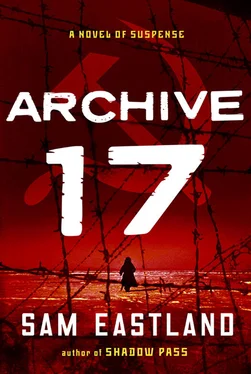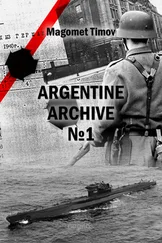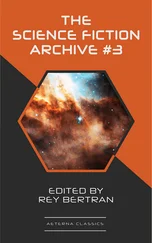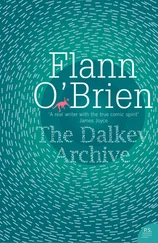Sam Eastland - Archive 17
Здесь есть возможность читать онлайн «Sam Eastland - Archive 17» весь текст электронной книги совершенно бесплатно (целиком полную версию без сокращений). В некоторых случаях можно слушать аудио, скачать через торрент в формате fb2 и присутствует краткое содержание. Жанр: Исторический детектив, на английском языке. Описание произведения, (предисловие) а так же отзывы посетителей доступны на портале библиотеки ЛибКат.
- Название:Archive 17
- Автор:
- Жанр:
- Год:неизвестен
- ISBN:нет данных
- Рейтинг книги:3 / 5. Голосов: 1
-
Избранное:Добавить в избранное
- Отзывы:
-
Ваша оценка:
- 60
- 1
- 2
- 3
- 4
- 5
Archive 17: краткое содержание, описание и аннотация
Предлагаем к чтению аннотацию, описание, краткое содержание или предисловие (зависит от того, что написал сам автор книги «Archive 17»). Если вы не нашли необходимую информацию о книге — напишите в комментариях, мы постараемся отыскать её.
Archive 17 — читать онлайн бесплатно полную книгу (весь текст) целиком
Ниже представлен текст книги, разбитый по страницам. Система сохранения места последней прочитанной страницы, позволяет с удобством читать онлайн бесплатно книгу «Archive 17», без необходимости каждый раз заново искать на чём Вы остановились. Поставьте закладку, и сможете в любой момент перейти на страницу, на которой закончили чтение.
Интервал:
Закладка:
Head bowed in the heat, Pekkala resembled a man who had lost something small on the ground and was retracing his steps to find it. The blood pounded behind his ears as he walked, stamping out a rhythm in his brain. Pekkala thought of stories he had heard about birds in the city of Florence which, driven mad in the summer heat, flew straight into the ground and killed themselves. He knew exactly how they felt .
When, at last, Pekkala reached the Alexander Palace, he paused beside the Tsukanov fountain, mesmerized by the glittering cascade of water .
The Tsarina had commissioned it from the architect Felix Tsukanov, who specialized in fountains and had been making the rounds of royal enclaves in Europe. These days it was no longer fashionable to have a palace without one of his creations .
The centerpiece was a large, tulip-shaped structure, from which the water spouted in three directions at once, falling into a waist-deep basin decorated with mosaics of koi fish .
The Tsar had confided in Pekkala that he hated the fountain. It was noisy and garish. “And what is a fountain for, anyway?” the Tsar had declared in exasperation. “The horses won’t even drink from it!”
Pekkala stood at the edge of the fountain, droplets splashing against his shirt and face. If he had given any thought to what he did next, he never would have done it. Before he knew what was happening, he had climbed into the fountain, without pausing to remove his clothes. He even kept his shoes on. As if compelled by forces beyond his control, he lowered himself into the water until he was sitting on the bottom and the water rippled above his head .
He remained there, eyes open, a pearl necklace of bubbles slowly escaping from his lips. It occurred to him that he had discovered the real purpose of this fountain .
There was no time to return to his cottage, change clothes, and make his way back to the palace. A summons from the Tsar required immediate action. And the Tsar, being the Tsar, had probably calculated exactly how long it should take Pekkala to walk the distance .
With as much dignity as he could manage, Pekkala clambered out of the fountain and made his way up the staircase to the palace balcony. With each footstep, water squelched from his shoes .
It was only when Pekkala reached the top of the stairs that he realized the Tsar was sitting on the balcony overlooking the front courtyard and must have witnessed the whole thing .
Pekkala walked over to the table where the Tsar was sipping tea in the shade of a large umbrella. He had been out on his horse and still wore tan riding breeches, along with brown knee-length leather boots. The Tsar had taken off his riding coat, revealing maroon suspenders that stretched over the shoulders of his white, collarless shirt. He seemed completely untroubled by the heat .
“Majesty,” said Pekkala, and bowed his head in greeting .
“Good afternoon, Pekkala. I would offer you something to drink, but you seem to have taken care of that all by yourself.”
In the moment of silence that followed, Pekkala heard the faint tap-tapping of water as it dripped from his sleeves and splashed on the yellowish-white stone of the balcony. The droplets sank into the stone, as if even the rock was thirsty in this heat .
“What brings you back from Spala, Majesty?”
The Tsar smiled mischievously. “Lena has brought me back.”
Pekkala had never heard of anyone named Lena before, at least in connection with the Tsar. As far as he knew, the only woman besides his wife for whom the Tsar harbored any affection was the prima ballerina of the Imperial Russian Ballet, Mathilde Kschessinska. “I look forward to meeting her, Majesty.”
The Tsar, who had been sipping his tea, burst out laughing. The delicate porcelain cup slipped from his fingers, fell to the ground and shattered musically on the stones. “Lena is not a woman!” said the Tsar. He glanced at the broken cup and seemed to be contemplating whether or not to bend down and pick it up .
Pekkala knew that the smashed cup would be swept up by the palace staff and deposited on a garbage heap near the gardener’s compost pile, close by the palace but hidden from view by a line of tall juniper bushes. No matter how slight the chip or blemish, any piece of imperfect crockery from the royal household was immediately taken out of circulation and could never be used again, by the Romanovs or anyone else. It was one of the quirks of the Tsarina that such a policy had gone into effect. To Pekkala it seemed wasteful, but even if he had been offered any of these slightly damaged saucers, bowls, or plates, he would not have wanted them, preferring wooden bowls and metal enamelware cups .
The same was not true of Mr. Gibbs, the English tutor of the Romanov children, who had been discovered one night, sitting in the middle of the crockery pile and hunting for pieces he could use .
“If Lena is not a woman …” began Pekkala .
“Lena is a place !” explained the Tsar, rising to his feet. “Come with me and I will show you.”
Mystified, Pekkala followed the Tsar down the long central hallway of the palace .
One of the housekeepers stuck her head out of the doorway of the kitchen, stared at the wet footprints on the polished wooden floor, then glared, beady-eyed, at Pekkala .
Arriving at the door to his gun room, the Tsar fished out a key and unlocked it. Unlike the other rooms in the palace, the gun room door was double-thick and reinforced with metal panels .
Inside, the walls were covered with rifles held in place by velvet-padded racks. Some of the guns dated back to the sixteenth century, while others were modern hunting rifles equipped with telescopic sights. The room had no windows, only a table in the center, covered with green felt, where the Tsar laid out and inspected his weapons before putting them to use on hunting trips or in clay pigeon tournaments .
The Tsar closed the door behind them, locked it from the inside, then turned and winked at Pekkala. “Almost there,” he said. Advancing to the center of the room, he grasped one corner of the table and motioned with his chin for Pekkala to pick up the other end. Together, they moved the table aside .
Then the Tsar rolled up the carpet which lay beneath the table, revealing a trapdoor in the floor .
“Lena is down there?” asked Pekkala .
“No,” replied the Tsar, “but what is down there came from Lena.”
Then, suddenly, Pekkala understood. The Tsar was talking about the Lena mine. It was one of the richest sources of gold in the country, and notorious for the harsh conditions under which the miners worked. In 1912 the workers had gone on strike, demanding better conditions. Rather than give in to their demands, the Tsar had sent in a regiment of Cossacks. By the time the strike was finally called off, hundreds of miners had been cut down by the Cossacks’ swords .
Pulling on a brass ring set flush into the floor, the Tsar opened the trapdoor and led Pekkala down a tightly spiraled stone staircase, lit by small electric bulbs. The air was cool and damp and hard to breathe. At last, deep underground, they arrived at an unpainted metal door set straight into the rock .
There was no lock on this last door, only a metal bolt, which the Tsar slid back with a dull clank. Then he pushed the door open, revealing a chamber of darkness so complete it felt to Pekkala like a patch of blindness in his eye. The Tsar gestured for Pekkala to enter. “After you,” he said .
Читать дальшеИнтервал:
Закладка:
Похожие книги на «Archive 17»
Представляем Вашему вниманию похожие книги на «Archive 17» списком для выбора. Мы отобрали схожую по названию и смыслу литературу в надежде предоставить читателям больше вариантов отыскать новые, интересные, ещё непрочитанные произведения.
Обсуждение, отзывы о книге «Archive 17» и просто собственные мнения читателей. Оставьте ваши комментарии, напишите, что Вы думаете о произведении, его смысле или главных героях. Укажите что конкретно понравилось, а что нет, и почему Вы так считаете.











